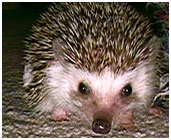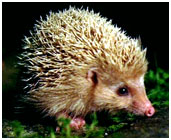Hedgehog is a nocturnal animal, found mainly in Africa, Europe, Asia and New Zealand. Read on to know some interesting facts and amazing information about Hedgehogs.
Facts About Hedgehog
Hedgehog is an animal, distinguished by the non-poisonous and non-barbed spines that cover its back. The animal is native to parts of Africa, Europe and Asia, apart from New Zealand. However, it is not found in North America, other than as a domestic pet. A hedgehog roots through hedges & other undergrowth, while searching for small creatures that make up its diet, thus the name. Hedgehogs are quite common as pets, especially in America, since prey on many common garden pests. These solitary creatures are insectivores and usually prey on large insects such as snails, centipedes, slugs, worms and beetles. However, hedgehogs also consume certain fruits and vegetables. Hedgehogs can climb, swim and run efficiently. Being a nocturnal animal, hedgehogs spend the daytime sleeping in its nest and they head out at nighttime. To know more about the animal, make use of the interesting facts and amazing information given below.

Facts about Hedgehog
Binomial Name: Erinaceus europaeus
Kingdom: Animalia
Phylum: Chordata
Class: Mammalia
Order: Erinaceomorpha
Family: Erinaceidae
Subfamily: Erinaceinae
Genera: Five (Atelerix, Erinaceus, Hemiechinus, Paraechinusera & Mesechinus)
Species: Around 15
Domesticated Species: African White-Bellied Hedgehog (Atelerix albiventris)
Length: 15 to 30 cm
Weight: 1.5 to 2.0 kg
Diet: Omnivorous
Natural Habitat: Parts of Europe, Asia, Africa, and New Zealand.
Age: 2 to 4 years (smaller species), 4 to 7 years (larger species)
Age of Maturity: 6 to 7 months
Gestation Period: 35 to 58 days
Number of Offspring: 3 to 4 (smaller species), 5 to 6 (larger species)
Interesting & Amazing Information on Hedgehogs
- Hedgehogs feed on insects, snails, frogs and toads, snakes, bird eggs, carrion, mushrooms, grass roots, berries, melons and watermelons.
- Whenever a hedgehog feels threatened, it curls itself into a ball. It does so by lowering its quills, making use of the two large muscles on either side of its back.
- A hedgehog is one of the few animals that hibernate.
- Hedgehogs do not form groups. Rather, they lead to a solitary life, coming together only to mate.
- Hedgehogs are nocturnal animals and have poor eyesight.
- A hedgehog has an excellent sense of smell, which allows it to detect a worm lying even under the ground.
- The hedgehog species is believed to be as much as around ten million years old.
- The babies of a hedgehog are born blind, but start seeing within a period of two weeks.
- Hedgehogs build a special hibernation nest in winters, known as a hibernaculum. It helps keep them frost free and dry throughout winter.
- The babies of a hedgehog leave their mother as well as their nest when they are around 4-5 weeks old.
- Hedgehogs can swim pretty well and can even climb trees.
- The normal heartbeat of a hedgehog is 190 beats per minutes. However, it comes down to just 20 beats per minute, when it is hibernating.
- The breeding season of a hedgehog is around April to September, while the main period of activity is May and June.
- The babies of a hedgehog have a high mortality rate.
- Hedgehogs are the only mammal covered in spikes. A hedgehog has about 7,000 spines on its body except on its chest and belly. Each spine falls out after a year and is replaced by another spine.
- Hedgehogs favour bananas.
- The spikes of quills of this animal are hollow hairs made from keratin.
- Hedgehogs are susceptible to cancers.
- Hedgehogs are listed as an endangered species.
- These species have immunity against venom and can resist stings from insects and reptiles.
- Male hedgehogs feed on newborns of their own kind.
- Self-anointing is an unusual behavior of hedgehogs. When these are fascinated by the scent of an object, their mouth forms scented saliva, which they smear all over their spines. Scientists are still puzzled by this behavior of theirs.
- Hedgehogs are slightly lactose intolerant.


See also
More from iloveindia.com
- Home Remedies | Ayurveda | Vastu | Yoga | Feng Shui | Tattoos | Fitness | Garden | Nutrition | Parenting | Bikes | Cars | Baby Care | Indian Weddings | Festivals | Party ideas | Horoscope 2015 | Pets | Finance | Figures of Speech | Hotels in India : Delhi | Hyderabad | Chennai | Mumbai | Kolkata | Bangalore | Ahmedabad | Jaipur
- Contact Us Careers Disclaimer Privacy Policy Advertise With Us Lifestyle Sitemap Copyright iloveindia.com. All Rights Reserved.




